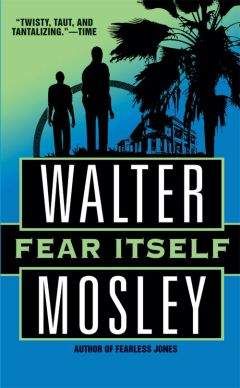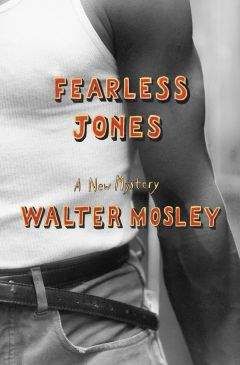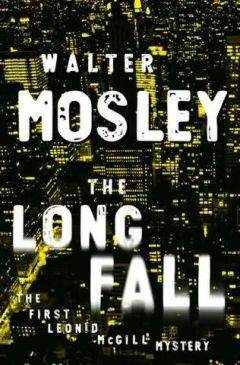Walter Mosley - The Last Days of Ptolemy Grey
“How come he didn’t wake up when you went in his house?” the child asked.
“’Cause when I came by earlier to give him your daddy’s rent I poured some laudanum in his gin when he wasn’t lookin’. You know he drink that gin ev’ry night. An’ when I was sure that he was paralyzed, I come on in an’ searched the house until I fount the treasure chest under a trapdo’ under his bed.”
“An’ he was sleep?” Ptolemy asked.
“Yeah.”
“So he don’t know you took it.”
“That don’t mattah to the white man. He don’t have to know. All he got to do is remembah that I was the last niggah he saw. I was the last he saw and so I’ma be the first he go to.”
“So you gonna run?”
“Damn right I’ma run. I’ma run all the way to New York City with the twenty coins I took for myself. I’ma go up there an’ I won’t see another cotton plant ever again in my life.”
At these words Li’l Pea Grey started to cry. Coy was his closest friend.
“Sometimes we got to make a sacrifice, Pity,” the old man said. “Now, come go wit’ me to my house so I could get my things and make it outta the county before sunup.”
They moved on back-road paths through the night headed for the lean-to shelter that Coy McCann had called home since the barber took over his room for his new wife and child. Ptolemy didn’t think anymore about his feet or the cold. He didn’t worry about the white people that might be after him or his uncle. He felt as if he were a soldier now, fighting on enemy ground, like in the stories he and Coy read down by the Tickle when the fish weren’t biting.
“Stay here,” Coy told Ptolemy at a stand of live oaks on a rise that looked down on the old man’s shelter.
“How come?”
“I wanna see you every minute I can before I’m gone forever,” Coy replied, “but this is my most dangerous moment. I got all my things in a bag in the house. I couldn’t take it with me because of how heavy the gold was gonna be. And I had to get you and show you where the gold was before I left. So now I just got to hope that old Jersey drunk enough drug to keep him sleepin’ through the night. But if it don’t, I don’t want him to find you down there wit’ me.”
Ptolemy slipped behind a tree as his uncle spoke, feeling both afraid and ashamed of his fear. He watched as Coydog McCann loped down the hill to his home. Just when he was at the tarp entrance, someone yelled and white men jumped out from all over the place.
The first white man cuffed Ptolemy’s friend, and the boy shouted, unable to keep the pain out of his mouth. But no one heard him because they were all shouting and hollering and beating Coy mercilessly, throwing him from man to man.
The sun was a red strip above the farthest hill.
Shouting loudly, Jersey Manheim asked Coy again and again where he had hidden his money. And for a long time Coy was silent. He was surrounded by thirteen men who meant to kill him, but Coy took the blows. Finally he shouted out something; the only words Ptolemy could make out were “... bottom of the well . . .”
Mercifully the vision of the lynching passed by the fevered dreamer’s eyes quickly. He only caught a glimpse of the hanging man dancing on fire while the white men laughed and raised their firebrands in the half darkness of dawn.
Twenty-six-year-old Sensia Howard was married to Ezra Bindle when Ptolemy, a man of forty-five years, met them at a barbecue in Griffith Park. Her yellow dress made its own party, and Ezra’s powerful arm held her so tightly about the waist that they might have been grafted like that.
Sensia was medium brown with dark hair that shone in the L.A. sunshine. Her eyes were different colors of brown and her smile made Ptolemy happy.
He mentioned a book he’d been reading and how much he liked going to the library on Avalon.
“You live near there?” Sensia asked innocently.
“Across the street. In a big blue boardinghouse,” Ptolemy said. “It’s funny that the house is so big ’cause my room the size of a two-cent postage stamp.”
“I own my own house,” Ezra said then. He was twice Ptolemy’s size, the color of aged red brick, and proud. “I keep my woman here in nice clothes, and I feed her steak three times a week.”
“What kinda book you readin’, Mr. Grey?” Sensia asked.
“Called Night Man. It’s about a man who live in darkness and who nevah see the light of day.”
“Nevah?”
“What you do for a livin’?” Ezra asked Ptolemy.
“I used to ’liver ice off a truck, but now I do cleanup for the county.”
“How much they pay you for that?”
“How does he go to the bank?” Sensia asked, obviously talking about the protagonist of Ptolemy’s book. “How does he go to the post office?”
“He does all his bankin’ by mail,” Ptolemy said. “An’ he, an’ there’s a twenty-four-hour post office he go to a lot.”
“That’s so interesting,” the young beauty said. “A man that’s just different from everybody else.”
“We gotta go, Sensie,” Ezra Bindle said. “Rex an’ them want us to have a drink together.”
“Can you come with, Mr. Grey?” she asked.
“They didn’t invite him,” Ezra said before Ptolemy could say yes.
“Then I’ll stay here an’ talk to Mr. Grey about his book while you go guzzle that beer,” she said, pushing out from the grip as she spoke.
“You are coming with me,” the big red-brown man said to his young wife. And he dragged her off.
Ptolemy had been married, started a family, and gotten divorced by that time. His children were almost grown, living with their mother, and he felt like an old man, except for a moment there under the scrutiny of Sensia Howard’s eyes.
But Ezra dragged her away through the parking lot and out past the baseball field, where uniformed white men in some amateur league played their game.
Ptolemy watched them go: Ezra pulling on her arm and Sensia struggling to get free. He felt almost as if the brute had pulled out one of his organs and was running away with it, leaving him wounded and sore.
Ptolemy was flying above the park then. It was really more like a small forest than a manicured lawn. It gave him a giddy feeling seeing all the various people and hidden animals, paths and clumps of trees.
He was flying above Los Angeles, and every once in a while he’d turn his gaze upward, where the blue was so intense that it made him feel as if he’d burn out his soul with the vision and so he had to look away, back to earth, where life was pedestrian and shabby.
He was flying in his sleep, rising higher and higher until he remembered that men were not made to fly and that sooner or later he would come crashing back down to the ground. The sudden fright woke him and he sat up in the bed in his window-less room in the big blue house across the street from the public library.
Ptolemy considered the dream of flying and fear of the fall. He thought about the picnic he had been to the weekend before with his friends who knew Ezra, who had a wife named Sensia.
It was 6:45 in the morning.
Someone knocked at the door.
There are times in your life when things line up and Fate takes a hand in your future,” Ptolemy remembered Coydog saying. “When that happens, you got to move quick and take advantage of the sitchiation or you’ll never know what might have been.”
“How do I know when it’s time to move quick?” L’il Pea asked.
“When somethin’ big happens and then somethin’ else come up.”
Ptolemy got out of the bed, laughing at the foolishness of his childhood. He’d loved his uncle and cried for days after the old man’s demise but he had come to understand that Coy McCann was a dreamer mostly and that his lessons were either useless or dangerous.
He opened the door, expecting a rooming-house neighbor who needed help of some sort. Everybody in the Blue Bonnet, as they called their home, was up early to go to work at some job cleaning or carrying, cooking or breaking stone.
When he opened the door and saw Sensia Howard standing there, all Ptolemy could think about was Coy and how well he understood even the incomprehensible. Coy became Ptolemy’s religion on that morning, standing in front of the most beautiful woman he had ever known.
Ptolemy gawped at the girl, who now wore a green frock that made her brown skin glow like fire.
“Are you gonna put on some pants, Mr. Grey?” were her first words to him.
He was standing there in boxer shorts, expecting some normal person who shouldn’t expect him to get dressed after being dragged from bed.
“Yeah, yeah,” he said. “Hold on.” And he went back to his closet and pulled out a pair of brown trousers and a yellow shirt.
As he dressed he remembered that he hadn’t asked her in. Maybe she’d think this was an insult and leave. And so he went back to the door without putting on socks and shoes.
Sensia was there, waiting.
“Come on in,” he said.
He only had one chair, and that had a book, a glass of water, and three stones he’d found that day at the park on it. They were blond stones, a color he’d never seen in rock and so he picked them up and brought them home, to be with them for a while. He wondered what Coy would have said about those pebbles as he removed them, the book, and the water glass from the chair.
“Where do you want me to sit?” Sensia asked.
“What are you doin’ here, Mrs. Howard?”
“Howard’s my maiden name and I’m not married no more. At least not as far as I’m concerned.”
“You not?”
“What day is it?” she asked.
“Thursday.”
“And what day did we meet?”
“Sunday. No, no . . . Saturday.”
She smiled, studied the seating arrangements, and sat on the straight-back pine chair.
“You go sit on the bed, Mr. Grey.”
He did so.
She beamed at him and nodded. “It was Saturday, because I left Ezra on Sunday, the day after he manhandled me.”
Ptolemy felt like a bug fixed in amber, caught forever in brilliance and beauty beyond his understanding.
“Mr. Grey?”
“Yes, Miss Howard?”
“Can I come sit next to you on your bed?”
He gulped, which gave the impression of a nod, and so she moved from chair to bed, putting her hand on his knee.
“My mama always told me,” she said, “that a woman must have at least three days between men. Three whole days or people could say that she was loose.”
Ptolemy said, “Monday, Tuesday, Wednesday,” and they kissed lightly.
“Why you shakin’ your head, Mr. Grey?”
“Because I’m almost forty-six, will be in two months and a half, and I have never seen you comin’.”
“I’m twenty-six,” Sensia said, and then kissed his cheek, “and I been waitin’ to find you every day I been alive.”
“Me?”
“I saw you at that barbecue party and I knew that you would read to me and hold me if I had fever. I knew that you would ask me how I was today and hear every word I said. A year later when I had forgot, you’d still be there to remind me. My man.”
“And that’s why you left Ezra?”
“No. I left Ezra because he pushed on me and grabbed at me. But he did that because he knew how much I wanted to be with you.”
With that, Sensia stood up and took off her green dress and Ptolemy knew that Coy was right.
“Are you gonna take off them pants?” she asked him, and the dream shifted while someone in the room moaned, either in ecstasy or pain.
He woke up to find her dead twenty-two years later. She hadn’t put on a pound, smoked, or drunk to excess, but she died of a stroke in her sleep while he dreamed of waking up to her smile. She wasn’t yet forty-nine, would never be. She’d had lovers and times away, but Ptolemy couldn’t bring himself to leave her (except once), nor could he bar her from their door. In the decade before she died she had begun to hoard things: suitcases and clothes, newspapers and books. She’d go to secondhand stores and buy hat racks and jewelry boxes, furniture and musical instruments that she meant to learn to play but never did. The kitchen had fallen into disrepair and they ate take-out food from pizza kitchens and Chinese restaurants that were no more than holes in the wall. Ptolemy would get up every morning and buy them coffee in Styrofoam cups at the diner two blocks down.
And he loved her.
“What do you think about this dress,” she’d ask him, twirling about in something new or used that she’d bought with money he made working for the county maintenance department.
He’d look at her posing, knowing that no man could get between this. She might meet someone now and then that distracted her; like Harlan Norman, who asked her to go to Hawaii with him. They spent a month, and all of Harlan’s money, on the islands, but then she came back, alone, with a big black pearl for Ptolemy.
There were many days that Ptolemy wanted to kill Sensia. He’d bought a short-barreled .25-caliber pistol once when she didn’t come home for the weekend. But then, on Tuesday, she walked through their apartment door and smiled for him. He forgot his mission and they made love and she said she was sorry.
One day she told him, “I will nevah cheat on you again, Papa,” and as far as he knew she hadn’t.
When he woke up that morning next to her corpse he cried for an hour; cried calling emergency; cried while the ambulance drivers tried to resuscitate her.
“Stroke,” the Asian paramedic said.
“She nevah did you right, Pitypapa,” Niecie said.
“Eleven hundred dollars,” the funeral director said.
“Amen,” the preacher said to a room filled with men and women that had been her lovers over the years. Even Ezra Bindle was there. He had a portly wife and seven portly children but he came to say good-bye because Sensia was the kind of woman that lovers pined after even when they no longer felt the love.
Ptolemy was already an old man. He read to Sensia at night and asked her about her day. He made her chicken soup when she was ill—and she was often ill. She was never out of his mind since the first day he’d seen her and she shook off the grip of Ezra Bindle to be his woman.
“Even if I wander, I will always find my way back home to you,” she’d told him.
He’d put those words on her tombstone, sold two of Coy’s doubloons to pay for it and for the flowers to be put on her grave every Valentine’s Day, her favorite holiday.
“Wake up, Uncle,” Robyn said from somewhere beyond the blue, blue sky above the graveyard.
Things began to happen quickly after the death and burial of Sensia Howard: Ptolemy saw himself as a young man with a stout lever under the light of an oil-soaked brand, moving the dark stone that hid the double-thick canvas bags filled with old gold coins; he was working, working, working cleaning out buildings set for demolition, or empty lots where the city planned to build, or the sidewalks in front of courts, office buildings, and police stations; he was talking to Coy in life and death, loving Sensia, missing his children (Rayford and Rayetta), who despised him after their mother had taken them away; and wondering what a treasure could do to save black folks who had been crushed down by a whole epoch of restrictions and pain.



